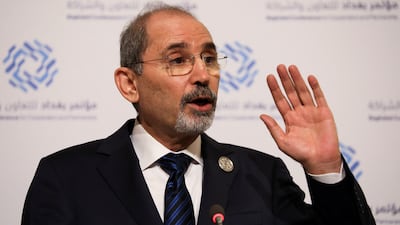The Jordanian and Lebanese foreign ministers discussed a dormant electricity supply agreement on Tuesday, with Jordan suggesting it is up to Beirut to meet international conditions for the deal to go though.
The arrangement, which would constitute about 10 per cent of Lebanon's electricity demand, was expected to start this month, passing through Syrian areas under President Bashar Al Assad's control.
The World Bank would have picked up the bill if Lebanon had implemented reforms aimed at curbing corruption that underpins its politico-administrative system.
"We all stand with Lebanon, but the reform and treatment should start from the inside of Lebanon," Jordanian Foreign Minister Ayman Al Safadi said in Amman after meeting Abdallah Bou Habib, his counterpart in the caretaker Lebanese government.
Jordan views the electricity agreement as enhancing a regional role undermined by Arab moves to normalise ties with Israel in the past few years.
It could also give a push for Jordanian efforts to accommodate the Alawite-dominated Syrian regime, after a long boycott by many Arab counties for its violent suppression of the 2011 revolt against five decades of Assad family rule.
Mr Al Safadi said Jordanian electricity could flow to Lebanon "the moment" the World Bank agrees to put up the money.
"We trust that our Lebanese brothers will surpass the challenges," he said.
Lebanon was under the tutelage of the Assad family for more than two decades before international pressure forced the Syrian President to withdraw his forces from the country in 2015.
Mr Al Assad, however, still has significant influence in Lebanon, largely through his alliance with the Shiite guerrilla group Hezbollah, which is also supported by Iran.
Acute electricity shortages have inflicted Lebanon since the 15-year civil war erupted in 1975, becoming even worse after the economy started melting down in 2019.


